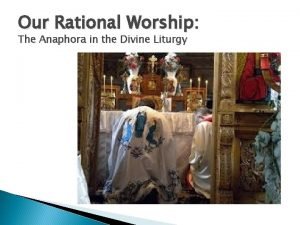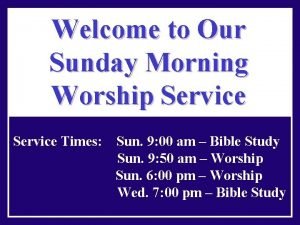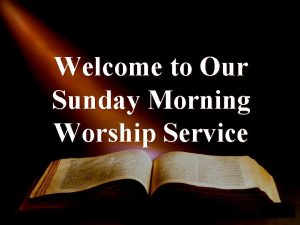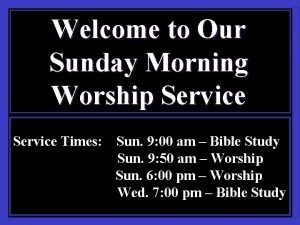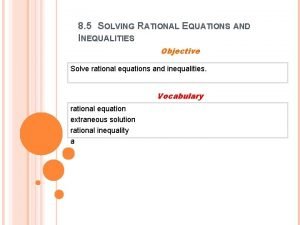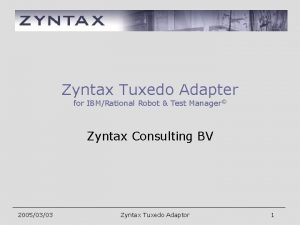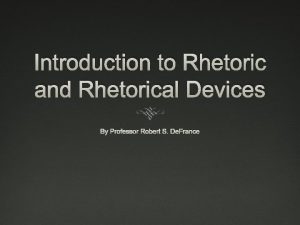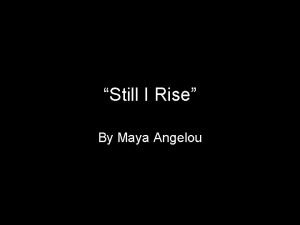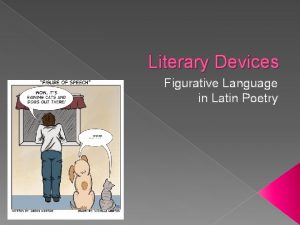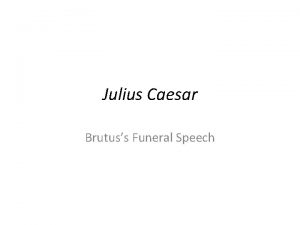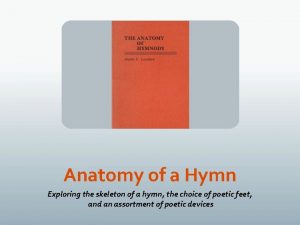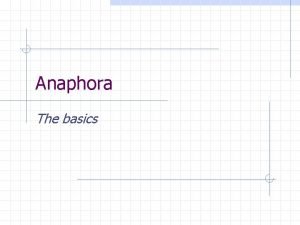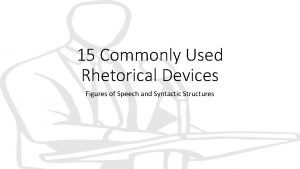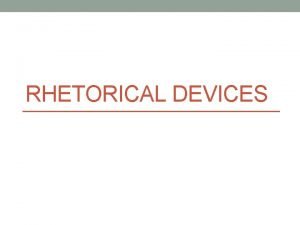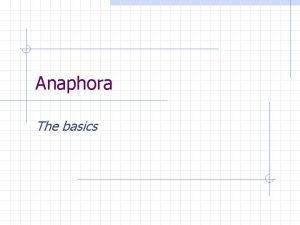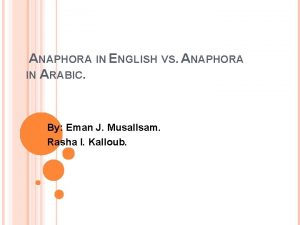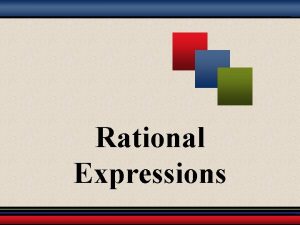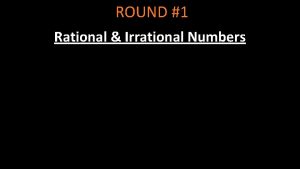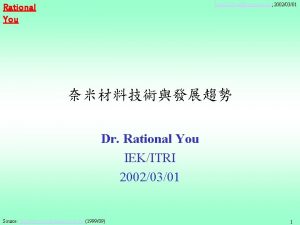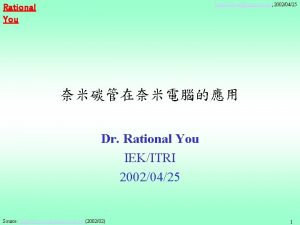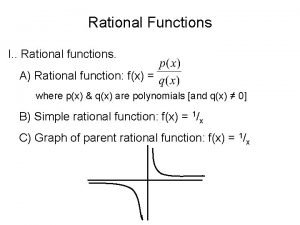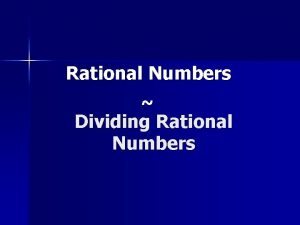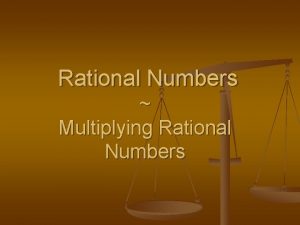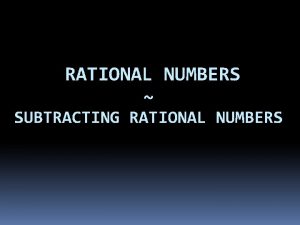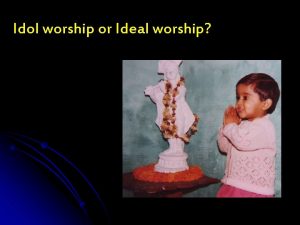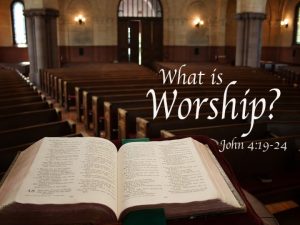Our Rational Worship The Anaphora in the Divine

















![The Anaphora of St Basil the Great � “…but when he disobeyed thee…and [was] The Anaphora of St Basil the Great � “…but when he disobeyed thee…and [was]](https://slidetodoc.com/presentation_image_h/c6c3bbb335a52de678f2e1aa5d54d061/image-18.jpg)




![The Anaphora of St John Chrysostom � “…and when we had fallen away [Thou] The Anaphora of St John Chrysostom � “…and when we had fallen away [Thou]](https://slidetodoc.com/presentation_image_h/c6c3bbb335a52de678f2e1aa5d54d061/image-23.jpg)


- Slides: 25

Our Rational Worship: The Anaphora in the Divine Liturgy

Overview � Unpacking the meaning of the terms used in this lecture’s title ◦ Keeping in mind the exact phrase is used in the liturgy � Discussing why we worship as we worship ◦ In contradistinction to how many Christians around us today worship � (Very) brief history of the Divine Liturgy � Exploring the powerful and profound teachings in the anaphora of Sts John Chrysostom and Basil the Great

The Meaning of “Our” � “Our” means it is communal, not private ◦ Remember the creation of humanity—male and female He created them �From the beginning we are created to be communal beings ◦ “For where two or three are gathered together in My name, I am there in the midst of them. ” (Mt 18: 20) � Part of “working out our salvation” is through the community ◦ Helps us to see our faults ◦ Provides both accountability and support

The Meaning of “Rational” � Rational, in this context, means no actual sacrifices being made ◦ This Christian understanding was unique/new to the religions of the ancient Near East ◦ The reason: Christ’s sacrifice was “once for all” (Romans 6: 10; Hebrews 7: 27, 9: 12, 10: 10) �At the Divine Liturgy we do not “re-sacrifice” Christ, but rather “remember” (i. e. make present) that ONE sacrifice � References sacrifice” to “unbloody (or bloodless) ◦ Oxymoronic in Semitic languages

The Meaning of “Worship” � Offering praise and glory to God ◦ Recognizing Him as “the boss” ◦ Simply because He is God � Giving thanks to God ◦ “For all things of which we know and of which we know not” (Liturgy of St JC) � Listening for God’s voice and listening to the prayers of the Church to discern God’s will � Notice what is absent ◦ Things related to “me” and what I want ◦ Anything related to “feelings”

Why Do We Worship the Way We Worship? � God-centered rather than man-centered ◦ Liturgical pattern of worship outline in the Old Testament ◦ Focuses on God and what we need to hear, not necessarily what we want to hear � Importance of remembrance ◦ Recall our discussion of Ezekiel 16 �God was upset with Israel because they did not “remember” Him bringing them out of Egypt �God “remembered” His covenant with Abraham and, on that basis alone, saved the Israelites �God told them that in the kingdom they would “remember” and be ashamed because they would realize they were there only on the basis of grace ◦ Anamnesis is the key aspect of the anaphora, which in turn is the central part of the Divine Liturgy

Why Do We Worship the Way We Worship? � Importance of symbolism ◦ A picture is worth a thousand words ◦ Symbols can provide deeper meaning than words �e. g. , handshake, hugs, gun salutes �Prostrations/metanias, entrances � In summation, the human person is more than intellect ◦ We incorporate all aspects of the human person and all senses into worship

Brief History of the Liturgy � Liturgies are as ancient as Christianity ◦ Natural transition from Jewish synagogue worship to early Christian worship � Liturgies were more diverse/numerous in the early Church ◦ Centralization after Constantine � However, all (known) liturgies follow the same basic pattern ◦ First outlined by Justin the Martyr in his 1 st Apology ◦ This same pattern is found in our liturgies �Although there are still minor, local differences

Two Main Portions of Every Christian Liturgy � 1 st: The Liturgy of The Word ◦ Referring to Scripture as “the word of God” ◦ This portion reaches its climax with the reading of Scripture �The reading of Scripture, of course, “calls to remembrance” the teaching of the Lord �The sermon attempts to make that teaching present to the modern-day worshippers �Note, however, the sermon is like a footnote—it may prove helpful, but is not required per se �On the other hand, the reading of the Scripture must take place because we are remembering Jesus’ words/teaching ◦ Other aspects: opening blessing/prayers, hymns

Two Main Portions of Every Christian Liturgy � 2 nd: The Liturgy of The Eucharist ◦ The Eucharist is “the Word of God, ” Jesus Christ ◦ This portion reaches its climax with the reception of the Eucharist/Holy Communion �But only after we remember what God has done (which parallels the remembrance in Ezekiel 16) �He created us to live in Paradise �We fell away through sinning �He restored us, but only on the basis of grace �The anaphora (“lifting up”) is what makes each liturgy unique from the others �Anaphora begins with “Let stand aright, let us attend, that we may offer the Holy Oblation in peace”; and ends with “The mercies of our Great God…” �Within the anaphora, specifically what makes each different is the anamnesis (remembrance)

Some Common Phrases � The Opening Words: “Let us stand aright; let us stand with fear; let us attend: that we may offer the Holy Oblation in peace. ” � “Let us give thanks unto the Lord. ” � “Take, eat…” and “Drink of this…” ◦ 1 Corinthians 11: 24 -25 � “Having in remembrance this saving commandment and all those things that have come to pass for us…” ◦ Cross, Grave, Resurrection, Ascension, Seating & Second Coming

Some Common Phrases � “And offering unto Thee Thine own of Thine own…”“We [praise, bless, give thanks, pray]…” ◦ Significance of participle vs. active verb � “Especially our all-holy, immaculate…” ◦ Recall the saints who have gone before us � “Among the first be mindful…” ◦ Shows our unity with the Apostles and other churches under that same episcopal authority � “And for those who offer these precious and holy gifts…” � “And grant us with one mouth and one heart…” ◦ Romans 15: 6

Some Differences � Main differences are in the main bodies of the text, which we will review last � Prayers of Consecration ◦ SJC: “Again we offer unto thee this rational and bloodless worship, and beseech thee and pray thee and supplicate thee: send down thy Holy Spirit upon us and upon these Gifts here spread forth: ” ◦ SBG: “Wherefore, O all-holy Master, we also, thy sinful and unworthy servants, whom thou hast graciously permitted to minister at thy holy Altar, not through our own righteousness—for we have done no good deed upon earth—but because of thy mercies and compassions, …we pray thee and implore thee…[to] show this Bread to be itself the precious Body of our Lord, and God, and Savior, Jesus Christ; ”

Some Differences � Prayers of Consecration ◦ After asking for the transformation of the bread and wine: ◦ SJC: “Changing them by Thy Holy Spirit. ” ◦ SBG: “[referring to the Body and Blood] which was shed for the life of the world � What St Basil’s difference here reveals: ◦ In Orthodoxy teaching, there is no “one point, ” no defining moment, when some “magical” change occurs— it’s about the ENTIRE service/process ◦ As evidence, AFTER the consecration the priest says: “Be mindful also, O Lord, of my unworthiness, according to the multitude of thy compassions; pardon me every transgression both voluntary and involuntary, and withhold not, because of my sins, the grace of thy Holy Spirit from these Gifts here spread forth. ”

Some Differences � Prayers After Consecration ◦ SBG: Detailed, lengthy prayers (for those in captivity/harsh circumstance, monastics, married, young, old, infants, etc. �Followed by one of my favorite lines (not only because of the depth, but because of the irony): “And those whom we through ignorance or forgetfulness or the multitude of names have not remembered, do thou thyself remember, O God, who knowest the time of life and name of each, and knowest every man even from his mother's womb. ” ◦ SJC: Summary of the above: church, civil authorities, armed forces, captives

The Anaphora of St Basil the Great � “O thou who dost truly exist, Master, Lord God, Father Almighty adorable…” ◦ Addressed directly to the Father ◦ “Who dost truly exist”: the “I AM” � “… and offer unto thee with contrite heart and spirit of humility this our reasonable service” � “…the Father of our Lord Jesus Christ…who is the image of thy goodness…in himself showing forth thee, the Father, the Living Word, the true God…” ◦ Jesus introduced secondarily, and to show that He is the one who shows forth the Father

The Anaphora of St Basil the Great � “…through whom the Holy Spirit was manifested…the pledge of an inheritance to come…by whom enabled every rational and intelligent creature doth serve thee…” ◦ The Spirit is now introduced through the Son ◦ He is a “pledge, ” an assurance ◦ The Holy Spirit is our “enabler” � “With these blessed Powers…” ◦ We join in with the “perpetual” heavenly worship � “When thou hadst created man, and…honored him with thine own image…thou didst set him in the midst of a Paradise of plenty, promising him life-eternal and the enjoyment of everlasting good things in keeping thy commandments…”
![The Anaphora of St Basil the Great but when he disobeyed theeand was The Anaphora of St Basil the Great � “…but when he disobeyed thee…and [was]](https://slidetodoc.com/presentation_image_h/c6c3bbb335a52de678f2e1aa5d54d061/image-18.jpg)
The Anaphora of St Basil the Great � “…but when he disobeyed thee…and [was] rendered subject to death…thou didst turn him again to the earth from which he was taken, providing for him the salvation of regeneration, which is in thy Christ himself…” ◦ God punishes for instruction, not destruction � “Yet thou didst not turn thyself away forever…neither didst thou forget the work of thy hands; but thou didst visit him in diverse manners, through thy tender mercies…” ◦ ◦ Prophets Mighty works through saints in every generation Gave the Law as an aid Appointed guardian angels

The Anaphora of St Basil the Great � “…and when the fullness of time was come, thou didst speak unto us through thy Son himself…the Express Image of thy Person…[who] thought it not robbery to be equal to thee, the God and Father…” � “But though he was God before all the ages, yet he appeared upon earth and dwelt among men; and was incarnate of a holy Virgin, and did empty himself, taking on the form of a servant, and becoming conformed to the fashion of our lowliness, that he might make us conformable to the image of his glory…”

The Anaphora of St Basil the Great � “…and when the fullness of time was come, thou didst speak unto us through thy Son himself…the Express Image of thy Person…[who] thought it not robbery to be equal to thee, the God and Father…” � “…he gave himself a ransom to Death…” ◦ Orthodox vs “satisfaction atonement” theology � “…and having descended into Hades…that he might fill all things…he loosed the pains of death, and rose again…making a way for all flesh unto the Resurrection from the dead…”

The Anaphora of St Basil the Great � “Ascending into heaven, he sat down at the right hand of thy Majesty on high; and he shall come again to render unto every man according to his works. ” � “And he hath left with us, as memorials of his saving Passion, these Things which we have set forth according to his commandment. ” ◦ The Eucharist connects us to that “once for all” sacrifice made by Jesus Christ � “Do this in remembrance of me: for as often as ye shall eat this Bread and drink of this Cup ye do proclaim my death and confess my resurrection. ”

The Anaphora of St John Chrysostom � “It is meet and right to hymn thee, to bless thee, to praise thee, to give thanks unto thee, and to worship thee in every place of thy dominion: for thou art God ineffable, inconceivable, invisible, incomprehensible, ever-existing and eternally the same, thou and thine Only-begotten Son and thy Holy Spirit. ” ◦ Still addressed directly to the Father, but no real “progression” in introduction of the Son/Spirit �Clearly, post-Nicene influence � “Thou it was who didst bring us from nonexistence into being…” ◦ Thanking God for our very existence
![The Anaphora of St John Chrysostom and when we had fallen away Thou The Anaphora of St John Chrysostom � “…and when we had fallen away [Thou]](https://slidetodoc.com/presentation_image_h/c6c3bbb335a52de678f2e1aa5d54d061/image-23.jpg)
The Anaphora of St John Chrysostom � “…and when we had fallen away [Thou] didst raise us up again, and didst not cease to do all things until thou hadst brought us back to heaven, and hadst endowed us with thy kingdom which is to come…” ◦ Much more of a summation than SBG’s �However, it is in the first section, not in the second ◦ The gift has already been given, but we must preserve it � “For all these things we give thanks unto thee…for all things of which we know, and of which we know not, and for all the benefits bestowed upon us, both manifest and unseen. ” ◦ In other words, we don’t even know what’s best for us, but we know you are looking out for us and thank you!

The Anaphora of St John Chrysostom � “… who hast so loved thy world as to give thine Only-begotten Son, that all who believe in him should not perish, but have everlasting life…” � “… who…in the night in which he was betrayed, or rather, gave himself up for the life of the world…” ◦ Puts the emphasis on Jesus’ actions, not Judas’ � “That to those who shall partake thereof they may be unto healing of soul, unto the remission of sins, unto the communion of thy Holy Spirit, unto the fulfillment of the kingdom of Heaven, unto boldness toward thee, and not unto judgment or unto condemnation. ” ◦ A reminder to prepare ourselves to receive the Eucharist

Highlights to Remember � Our worship is communal, not private � We offer a “rational” worship—no animal sacrifice � The service focuses on God, His greatness, and His mercy, not on us � Our liturgy focuses on the “remembrance” of God, which is the core aspect of biblical worship � Although the details of each liturgy differ, they all call our attention to God, remembering not only the past, but the future Day of Judgment and the eternal Kingdom
 Rational worship meaning
Rational worship meaning Welcome to sunday morning worship
Welcome to sunday morning worship Our sunday morning
Our sunday morning Welcome to our worship service
Welcome to our worship service Welcome to our sunday service
Welcome to our sunday service 8-5 solving rational equations and inequalities
8-5 solving rational equations and inequalities Ibm rational robot
Ibm rational robot Example of an epithet
Example of an epithet Anaphora definition
Anaphora definition Syntheton examples
Syntheton examples Anaphora function
Anaphora function Antistrophe definition
Antistrophe definition Still i rise poetic word cloud
Still i rise poetic word cloud Anaphora latin
Anaphora latin Polysyndeton image
Polysyndeton image Anaphora poetic device
Anaphora poetic device Rhetorical devices examples
Rhetorical devices examples Difference between anaphora and parallelism
Difference between anaphora and parallelism Brutus funeral speech
Brutus funeral speech Anaphora examples in poem
Anaphora examples in poem Cataphora in linguistics
Cataphora in linguistics Splunkly
Splunkly Donkey anaphora
Donkey anaphora Antecedent anaphora
Antecedent anaphora Hypophora effect
Hypophora effect Parallelism literary device
Parallelism literary device
